fello
-
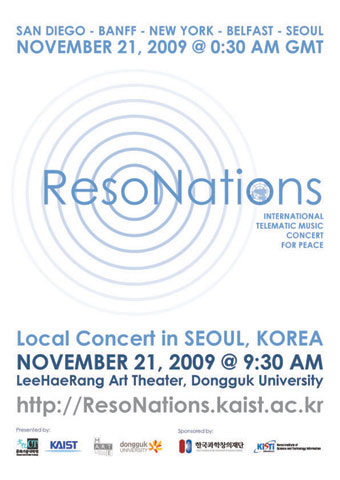 Int'l Telematic Music Concert for Peace to Take Place on Nov. 20
Renowned musicians in five international locations perform new contemporary music works for peace through a real-time performance on the internet. Local audiences in Seoul, Banff, New York, San Diego and Belfast will also have a chance to hear a program.
In Seoul, the "International Telematic Music Concert for Peace" will be held at the LeeHaeRang Art Theater, Dongguk University, in Seoul on Nov. 20 at 9:30 a.m., under the presentation of KAIST"s Graduate School of Culture Technology and MARTE Lab, Dongguk University. Telematic music is real-time performance via the internet by musicians in different geographic locations.
The program of the concert includes "Hope"s Dream" by Mark Dresser and Sarah Weaver; "Disparate Bodies" by Pedro Rebelo, "Rock, Paper, Scissors" by Chris Chafe. The Korean act to be performed is "Green-colored Harmony" by Jun Kim.
In addition to the two Korean universities, the World Association of Former United Nations Internes and Fellows (WAFUNIF), University of California San Diego, the Banff Center of Canada and Queen"s University in Belfast are participating in the project.
The performance will take place on high-bandwidth internet with JackTrip audio software developed by Chris Chafe and Access Grid video software developed at Argonne National Laboratory.
"Connecting the five different cities together through super-speed Internet network and transmitting sound and images in real time is challenging technically. But, we also expect that more exciting results will be created in the course of transforming the sound into visual images," said Woon-Seung Yeo, a professor of the Graduate School of Culture Technology, who was responsible for visuals in the project.
2009.11.19 View 16129
Int'l Telematic Music Concert for Peace to Take Place on Nov. 20
Renowned musicians in five international locations perform new contemporary music works for peace through a real-time performance on the internet. Local audiences in Seoul, Banff, New York, San Diego and Belfast will also have a chance to hear a program.
In Seoul, the "International Telematic Music Concert for Peace" will be held at the LeeHaeRang Art Theater, Dongguk University, in Seoul on Nov. 20 at 9:30 a.m., under the presentation of KAIST"s Graduate School of Culture Technology and MARTE Lab, Dongguk University. Telematic music is real-time performance via the internet by musicians in different geographic locations.
The program of the concert includes "Hope"s Dream" by Mark Dresser and Sarah Weaver; "Disparate Bodies" by Pedro Rebelo, "Rock, Paper, Scissors" by Chris Chafe. The Korean act to be performed is "Green-colored Harmony" by Jun Kim.
In addition to the two Korean universities, the World Association of Former United Nations Internes and Fellows (WAFUNIF), University of California San Diego, the Banff Center of Canada and Queen"s University in Belfast are participating in the project.
The performance will take place on high-bandwidth internet with JackTrip audio software developed by Chris Chafe and Access Grid video software developed at Argonne National Laboratory.
"Connecting the five different cities together through super-speed Internet network and transmitting sound and images in real time is challenging technically. But, we also expect that more exciting results will be created in the course of transforming the sound into visual images," said Woon-Seung Yeo, a professor of the Graduate School of Culture Technology, who was responsible for visuals in the project.
2009.11.19 View 16129 -
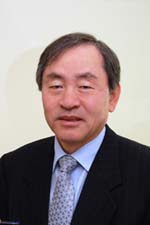 Prof. Cho Wins Best Paper Award
KAIST Prof. Nam-Zin Cho of the Department of Nuclear and Quantum Engineering, won the Best Thesis Award in the nuclear reactor physics category at the 2008 Winter Meeting of the American Nuclear Society held on Nov. 9-13 in Reno, Nevada.
His paper, entitled "Thermal Feedback Transient Analysis of a Pebble Fuel Based on the Two-Temperature Homogenized Model," was jointly authored by Hwi Yu and Jong-Un Kim under the guidance of Prof. Cho.
Prof. Cho was elected a fellow of the American Nuclear Society in 2001 and has served as the deputy editor of the Nuclear Science and Engineering, the research journal of the American Nuclear Society, since 1999.
2008.12.09 View 17012
Prof. Cho Wins Best Paper Award
KAIST Prof. Nam-Zin Cho of the Department of Nuclear and Quantum Engineering, won the Best Thesis Award in the nuclear reactor physics category at the 2008 Winter Meeting of the American Nuclear Society held on Nov. 9-13 in Reno, Nevada.
His paper, entitled "Thermal Feedback Transient Analysis of a Pebble Fuel Based on the Two-Temperature Homogenized Model," was jointly authored by Hwi Yu and Jong-Un Kim under the guidance of Prof. Cho.
Prof. Cho was elected a fellow of the American Nuclear Society in 2001 and has served as the deputy editor of the Nuclear Science and Engineering, the research journal of the American Nuclear Society, since 1999.
2008.12.09 View 17012 -
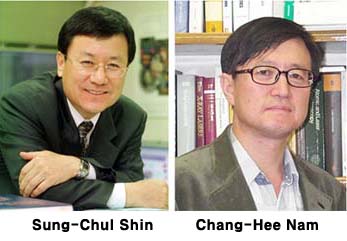 Two KAIST Professors Elected Fellows of APS
Profs. Sung-Chul Shin and Chang-Hee Nam of the Department of Physics, KAIST, have recently been elected the 2009 fellows of the American Physical Society (APS), university officials said on Tuesday (Dec. 2).
The APS fellowship is a prestigious recognition of the two professors" outstanding academic achievements in the field of physics, the officials said. The selection criteria are known to be extremely stringent and only a small fraction of APS members become fellows.
Prof. Shin was cited for his pioneering contributions to the understanding of magnetization reversal dynamics, in particular critical scaling behavior of Barkhausen avalanches of 2D ferromagnets, and discovery of novel magnetic thin films and multilayers for high-density data storage.
Prof. Nam was recognized for his contributions to the theory and experiments of physical processes of high harmonic generation for the development of attosecond coherent x-ray sources and related femtosecond laser technology.
The American Physical Society, founded in 1899, is the world"s second largest organization of physicists, behind the Deutsche Physikalische Gesellschaft. It has 46,000 members across the world.
2008.12.04 View 16760
Two KAIST Professors Elected Fellows of APS
Profs. Sung-Chul Shin and Chang-Hee Nam of the Department of Physics, KAIST, have recently been elected the 2009 fellows of the American Physical Society (APS), university officials said on Tuesday (Dec. 2).
The APS fellowship is a prestigious recognition of the two professors" outstanding academic achievements in the field of physics, the officials said. The selection criteria are known to be extremely stringent and only a small fraction of APS members become fellows.
Prof. Shin was cited for his pioneering contributions to the understanding of magnetization reversal dynamics, in particular critical scaling behavior of Barkhausen avalanches of 2D ferromagnets, and discovery of novel magnetic thin films and multilayers for high-density data storage.
Prof. Nam was recognized for his contributions to the theory and experiments of physical processes of high harmonic generation for the development of attosecond coherent x-ray sources and related femtosecond laser technology.
The American Physical Society, founded in 1899, is the world"s second largest organization of physicists, behind the Deutsche Physikalische Gesellschaft. It has 46,000 members across the world.
2008.12.04 View 16760 -
 Three Professors Selected as IEEE Fellows
Three Korea Advanced Institute of Science and Technology (KAIST)’s professors, Ju-Jang Lee, Yong-Hee Lee, and Hoi-Jun Yoo, were selected as a part of the 2008 Institute of Electrical and Electronics Engineers, Inc (IEEE)’s “Fellows.” A Fellow is the highest level of membership given only to those “with an extraordinary record of accomplishments” in their field of study. Although some IEEE memberships can be gained freely by all, the Fellow status is bestowed only by the IEEE Board of Directors.
Professor Ju-Jang Lee was awarded the Fellow status “for contributions to intelligent robust control and robotics.” Robust control is a system’s stable maintenance under many inputs in a dynamic environment. A part of KAIST’s Electrical Engineering Department, Professor Ju-Jang Lee has conducted successful research in these fields, and has published 538 papers. He also holds many patents in and outside of the country, and is the General Chair for two upcoming IEEE conferences in 2008 and 2009.
Professor Yong-Hee Lee of KAIST’s Physics Department was recognized for his “contributions to photonic devices based upon vertical cavity surface emitting lasers and photonic crystals.” Photonic devices are those that allow the practical use of photons, and photon crystals are structures that affect the motion of photons. Professor Yong-Hee Lee is an expert in the field of Photonics and his works have been cited over 2500 times. He is also an outstanding speaker, giving over 30 lectures in front of international audiences in the past 5 years, and receiving The Distinguished Lecturer’s Award from IEEE.
Professor Hoi-Jun Yoo was granted the prestigious Fellow status for his “contributions to low-power and high-speed VLSI design.” VLSI stands for ‘very large scale integration’ and refers to the skill for packing a huge number of semiconductors on an integrated circuit. Professor Lee’s Fellow status is noteworthy in that he studied, worked, and researched solely in Korea. He is also the youngest of the three KAIST professors to be granted membership in the class of 2008 Fellowship. IEEE also recognized Professor Yoo as the most frequent publisher during the past 8 years.
IEEE, originally concentrating on Electric Engineering, has now branched into many related fields. It is a nonprofit organization, and its aim is to be the world"s leading professional association for the advancement of technology. For its Fellow Class of 2008, 295 members were chosen; which is less that 0.1% of their total members.By KAIST Herald on December, 2007
2007.12.21 View 22174
Three Professors Selected as IEEE Fellows
Three Korea Advanced Institute of Science and Technology (KAIST)’s professors, Ju-Jang Lee, Yong-Hee Lee, and Hoi-Jun Yoo, were selected as a part of the 2008 Institute of Electrical and Electronics Engineers, Inc (IEEE)’s “Fellows.” A Fellow is the highest level of membership given only to those “with an extraordinary record of accomplishments” in their field of study. Although some IEEE memberships can be gained freely by all, the Fellow status is bestowed only by the IEEE Board of Directors.
Professor Ju-Jang Lee was awarded the Fellow status “for contributions to intelligent robust control and robotics.” Robust control is a system’s stable maintenance under many inputs in a dynamic environment. A part of KAIST’s Electrical Engineering Department, Professor Ju-Jang Lee has conducted successful research in these fields, and has published 538 papers. He also holds many patents in and outside of the country, and is the General Chair for two upcoming IEEE conferences in 2008 and 2009.
Professor Yong-Hee Lee of KAIST’s Physics Department was recognized for his “contributions to photonic devices based upon vertical cavity surface emitting lasers and photonic crystals.” Photonic devices are those that allow the practical use of photons, and photon crystals are structures that affect the motion of photons. Professor Yong-Hee Lee is an expert in the field of Photonics and his works have been cited over 2500 times. He is also an outstanding speaker, giving over 30 lectures in front of international audiences in the past 5 years, and receiving The Distinguished Lecturer’s Award from IEEE.
Professor Hoi-Jun Yoo was granted the prestigious Fellow status for his “contributions to low-power and high-speed VLSI design.” VLSI stands for ‘very large scale integration’ and refers to the skill for packing a huge number of semiconductors on an integrated circuit. Professor Lee’s Fellow status is noteworthy in that he studied, worked, and researched solely in Korea. He is also the youngest of the three KAIST professors to be granted membership in the class of 2008 Fellowship. IEEE also recognized Professor Yoo as the most frequent publisher during the past 8 years.
IEEE, originally concentrating on Electric Engineering, has now branched into many related fields. It is a nonprofit organization, and its aim is to be the world"s leading professional association for the advancement of technology. For its Fellow Class of 2008, 295 members were chosen; which is less that 0.1% of their total members.By KAIST Herald on December, 2007
2007.12.21 View 22174 -
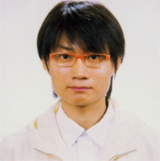 Ki-Won Lee Receives Best Student Paper Award
Ki-Won Lee Receives Best Student Paper Award
Ki-Won Lee, a doctoral student of Materials Science & Engineering, has received the Best Student Paper Award ‘Motorola Fellowship Award’ at 2007 Electronic Components and Technology Conference (ECTC).
Lee’s paper is about a new bonding process of anisotropic conductive film using ultrasonic wave, which applies ultrasonic wave, instead of thermal compression, at the room temperature to reduce the process time from ten to three seconds.
The recipients of Motorola Fellowship Award are selected by IEEE Components, Packaging and Manufacturing Technology Society, and Motorola awards special scholarship to recipients. The ECTC is the world’s largest yearly conference concerning electronic packaging technologies with more than 1,000 attendees and more than 300 presented papers.
2007.07.02 View 19954
Ki-Won Lee Receives Best Student Paper Award
Ki-Won Lee Receives Best Student Paper Award
Ki-Won Lee, a doctoral student of Materials Science & Engineering, has received the Best Student Paper Award ‘Motorola Fellowship Award’ at 2007 Electronic Components and Technology Conference (ECTC).
Lee’s paper is about a new bonding process of anisotropic conductive film using ultrasonic wave, which applies ultrasonic wave, instead of thermal compression, at the room temperature to reduce the process time from ten to three seconds.
The recipients of Motorola Fellowship Award are selected by IEEE Components, Packaging and Manufacturing Technology Society, and Motorola awards special scholarship to recipients. The ECTC is the world’s largest yearly conference concerning electronic packaging technologies with more than 1,000 attendees and more than 300 presented papers.
2007.07.02 View 19954 -
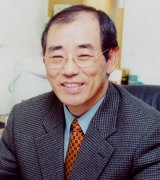 Prof. Bien Named IFSA Fuzzy Fellow
Prof. Bien Named IFSA Fuzzy Fellow
Zeungnam Bien, a professor of Electrical Engineering, has been named a Fuzzy Fellow of the International Fuzzy Systems Association (IFSA).
IFSA Fuzzy Fellows are named by the Fuzzy Fellows Committee based on the degree of technical contributions to the fuzzy set and its relevant fields and the degree of contribution for the establishment of fundaments in the field of advanced applied technologies development and fuzzy fields. IFSA has named total 36 fellows since its first one at the world congress in Prague in 1997.
Professor Bien has worked as the chairman of the IFSA and will be officially named a Fuzzy Fellowship at the IFSA World Congress at Cancun, Mexico in June.
2007.04.19 View 16520
Prof. Bien Named IFSA Fuzzy Fellow
Prof. Bien Named IFSA Fuzzy Fellow
Zeungnam Bien, a professor of Electrical Engineering, has been named a Fuzzy Fellow of the International Fuzzy Systems Association (IFSA).
IFSA Fuzzy Fellows are named by the Fuzzy Fellows Committee based on the degree of technical contributions to the fuzzy set and its relevant fields and the degree of contribution for the establishment of fundaments in the field of advanced applied technologies development and fuzzy fields. IFSA has named total 36 fellows since its first one at the world congress in Prague in 1997.
Professor Bien has worked as the chairman of the IFSA and will be officially named a Fuzzy Fellowship at the IFSA World Congress at Cancun, Mexico in June.
2007.04.19 View 16520 -
 Professor Chung-Seok Chang named as APS Fellow
Professor Chung-Seok Chang named as APS Fellow
- Honorable position offered only to an extremely small number of members within 0.5% of APS
- Recognized for his leading and creative contribution to Plasma conveyance theory, Electromagnetic waves heating theory and leadership in the research field of large-scaled computer simulation
Professor Chung-Seok Chang (Department of Physics) was named as a fellow of the American Physics Society (APS), world-renowned society in the physics filed.
The fellow of the APS is considered as a position of great honor among scholars in the field of Physics since only a small number of regular members within 0.5% of the APS can become the fellows. Professor Chang was recognized for his leading and creative contribution to the fields of Plasma conveyance theory, Electromagnetic waves heating theory and leadership in the research field of large-scaled computer simulation, which made him named as APS fellow.
Professor Chang has been invited several times to the Main Policy Committee of the U.S. Department of Energy and was a member of On-site Review Committee on the theoretical research activities of the U.S. major state-run institutes. Due to many world-recognized research results carried out with KAIST students, he has been invited several times for lecture to the conference of the APS as well as large-scaled international academic conferences. As a result, KAIST doctorates of Computational Physics from his laboratory are recognized globally for their excellence in the field of nuclear fusion.
Besides, Professor Chang was assigned as the Chief General of the super-sized Computational Theory Research Group last year, to which the U.S Department of Energy will invest 6 million dollars of research fund for three years, and manages the complex theory research group that transcribes and reproduces the properties of nuclear fusion plasma by using large-scaled parallel computers with its head quarter in the U.S. Courant Institute of Mathematical Sciences. This research group consists of greatest U.S. scholars in the fields of Physics, Mathematics, and Computation, belonging to 14 research-education institutes such as Princeton University, Colombia University, MIT, University of California Engineering College, California State University, Rutgers University, New-York University, Courant Institute of Mathematical Sciences, Oak Ridge National Lab, Berkeley National Laboratories, etc., thereby gathering worldwide
2006.10.25 View 15701
Professor Chung-Seok Chang named as APS Fellow
Professor Chung-Seok Chang named as APS Fellow
- Honorable position offered only to an extremely small number of members within 0.5% of APS
- Recognized for his leading and creative contribution to Plasma conveyance theory, Electromagnetic waves heating theory and leadership in the research field of large-scaled computer simulation
Professor Chung-Seok Chang (Department of Physics) was named as a fellow of the American Physics Society (APS), world-renowned society in the physics filed.
The fellow of the APS is considered as a position of great honor among scholars in the field of Physics since only a small number of regular members within 0.5% of the APS can become the fellows. Professor Chang was recognized for his leading and creative contribution to the fields of Plasma conveyance theory, Electromagnetic waves heating theory and leadership in the research field of large-scaled computer simulation, which made him named as APS fellow.
Professor Chang has been invited several times to the Main Policy Committee of the U.S. Department of Energy and was a member of On-site Review Committee on the theoretical research activities of the U.S. major state-run institutes. Due to many world-recognized research results carried out with KAIST students, he has been invited several times for lecture to the conference of the APS as well as large-scaled international academic conferences. As a result, KAIST doctorates of Computational Physics from his laboratory are recognized globally for their excellence in the field of nuclear fusion.
Besides, Professor Chang was assigned as the Chief General of the super-sized Computational Theory Research Group last year, to which the U.S Department of Energy will invest 6 million dollars of research fund for three years, and manages the complex theory research group that transcribes and reproduces the properties of nuclear fusion plasma by using large-scaled parallel computers with its head quarter in the U.S. Courant Institute of Mathematical Sciences. This research group consists of greatest U.S. scholars in the fields of Physics, Mathematics, and Computation, belonging to 14 research-education institutes such as Princeton University, Colombia University, MIT, University of California Engineering College, California State University, Rutgers University, New-York University, Courant Institute of Mathematical Sciences, Oak Ridge National Lab, Berkeley National Laboratories, etc., thereby gathering worldwide
2006.10.25 View 15701